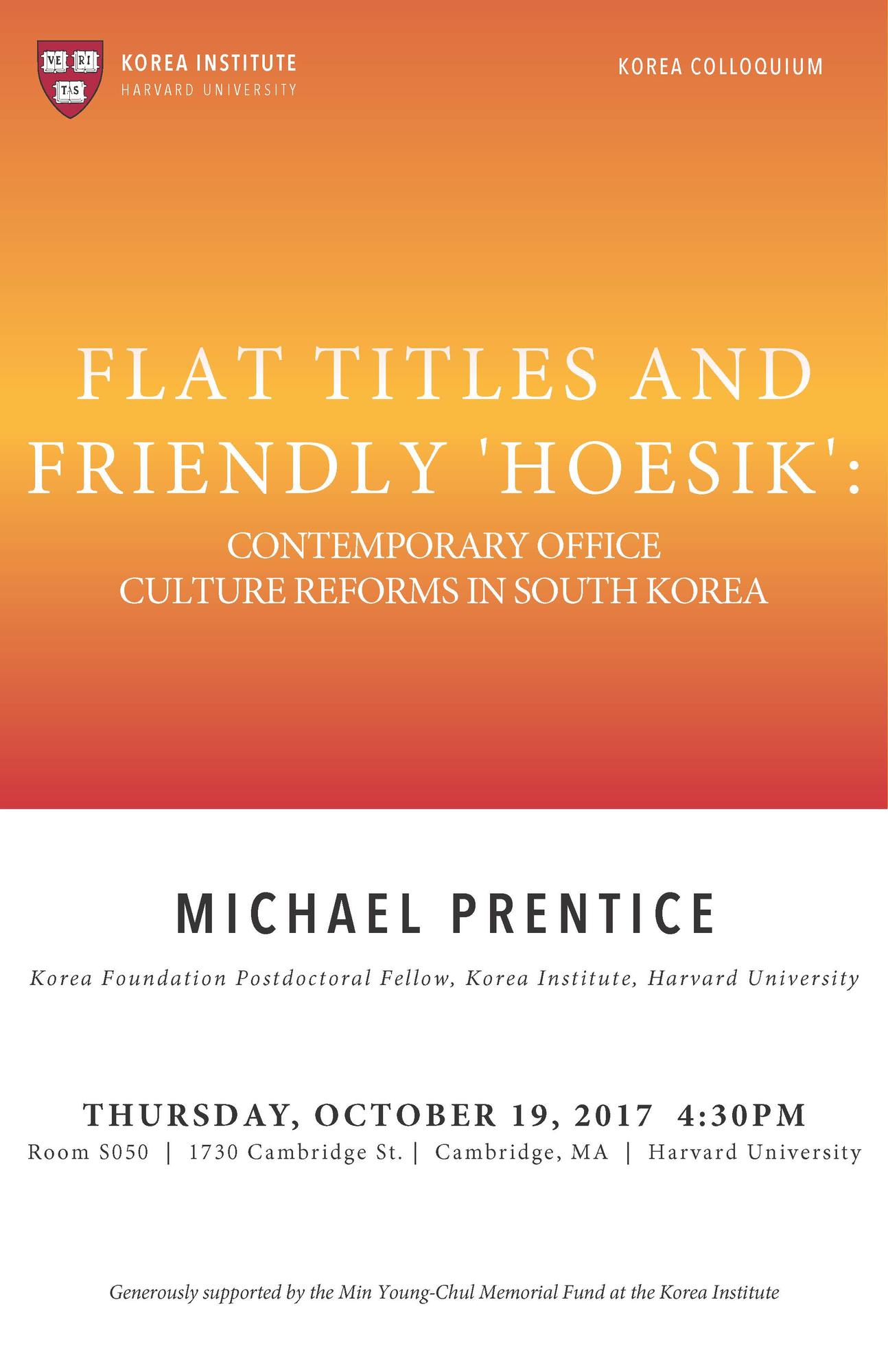Date:
Location:
Korea Colloquium
Michael Prentice
Korea Foundation Postdoctoral Fellow, Korea Institute, Harvard University
Michael Prentice is a linguistic anthropologist who focuses on language, management, and technology in contemporary South Korea. For his dissertation, he spent a year as an ethnographer-intern inside a steel conglomerate in Seoul. His dissertation seeks to understand how control operates in South Korean corporate worlds through an emphasis on the forms of writing, technologies, and events that mediate office life. In contrast to the image of centralized and top-down control emanating from family-owners, his dissertation shows how high-level managers are equally constrained by and occupied with the documents, systems, and meetings used to control their own complex empires. As South Korea continues to wrestle with conglomerates as regulatory objects and sites of office inequality, his research points to the ways that conglomerate managers themselves are tied up by many of these same concerns. His research has received support from the Korea Foundation, Academy of Korean Studies, the Wenner-Gren Foundation, and the Fulbright Program.
Michael graduated from Brown University with a bachelor's degree in anthropology-linguistics and Italian Studies. He is originally from Baltimore and has lived at different times in Philadelphia, New York, and Bologna, Italy in addition to Ann Arbor and Seoul. He first became interested in South Korean office life while working in corporate marketing and reading a lively biography about Chung Ju Yung.
Chaired by Nicholas Harkness, John L. Loeb Associate Professor of the Social Sciences, Harvard University
Abstract:
Today many South Korean companies are reforming how their employees talk and interact with each other, often drawing on models of Western office culture to do so. Public relations discourses around these reforms center on removing traditional features of vertical hierarchy in an effort to make offices “flat” (supyeongjeok) and therefore more efficient, more worker friendly, and more modern. Prominent reforms include efforts to flatten titles and modes of address, such as the “manager-ization” of ranking systems at conglomerates like SK and KT, the “nim” first-name policy at CJ Group, and the English-based naming at leading tech companies. Based on 18 months of research combining interviews with corporate managers and embedded fieldwork at the headquarters of a steel conglomerate in Seoul, this talk suggests that these office reforms reflect an internal critique of the practices of an older generation of manager type. I situate the news-grabbing reforms to language alongside a host of other office culture reforms such as the implementation of "family days," emphases on "two-way communication," the curtailing of company-sponsored drinking (“119 policies”), encouragement of small-group social activities, and the institution of “mentoring” programs between older and younger employees. These policies draw on a common register of positive office sociality to indirectly target the norms and practices of older male managers, whose practices have become increasingly criticized for fostering inter-generational abuse, wasting corporate funds, and detracting from family ties. However, as these policies map onto different dimensions of office interaction, from modes of address to social activities and sometimes to work itself, they have not always created a clear division between old and young in practice. In some cases reforms have unintentionally re-enforced the authority of older managers, in others they have made work itself more confusing, and in others they have adversely affected all employees including those carrying out the reforms. This presentation suggests that adoptions of Western styles of office culture in Korea must be considered in the context of emergent generational distinctions among office workers, and that reforms or policies aiming to improve office culture often do not anticipate the wider social and interactional dimensions in which authority in Korea is situated.
Generously supported by the Min Young-Chul Memorial Fund at the Korea Institute.